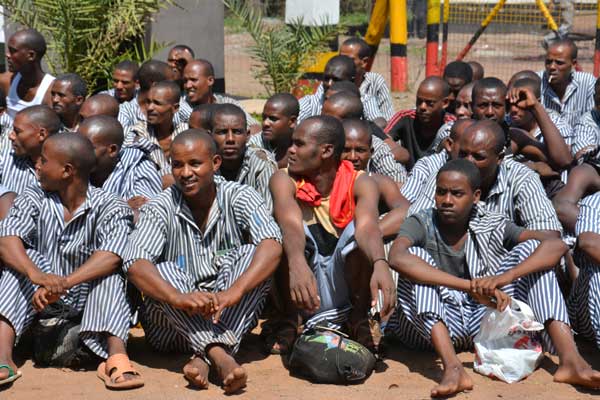105 Ethiopians released from Isiolo prison in kenya to be deported

105 Ethiopians who were being held at the Isiolo GK Prison were Tuesday released after the Meru High Court reviewed their sentences.
The court quashed jailed sentences for the foreigners ranging from one to three years or fines of Sh100,000 and Sh500,000.
Speaking after receiving the court repatriation order, the County Prison Commander Ibrahim Hassan said two probation officers were sent by the National Chairman for Community Service Order Luka Kimaru to interrogate the prisoners before a report was made to the court.
“It emerged that the aliens were on transit on a job hunting mission and were not criminals,” said Mr Hassan.
The Ethiopians, some of whom have been held at the facility for more than two months were all arrested within Isiolo County.
In November 2014, 383 Ethiopians were also released from the Isiolo Prison and repatriated.
HUGE RELIEF TO PRISON
Mr Hassan said the order was a huge relief for the correctional facility which is designed to hold a maximum of 150 inmates.
Due to the influx of Ethiopians, the institution was now holding up to 300 inmates and was forced to transfer some to other facilities.
Mr Hassan hailed the Meru High court for the decongestion.
He said the main challenge the institution faced due to the influx was accommodation and pending bills of food and bedding of up to Sh8 million.
He further said that such an amount of tax payers’ money could have been utilised on other development projects if the foreigners had been deported much earlier.
Mr Hassan said that the prisoners consumed eight 90 kg bags of maize flour for lunch and supper adding that their continued presence in the prison would have cost the government much more.
REHABILITATE INMATES
He noted that the main role of the prison service was to rehabilitate inmates and make them better people in the society but in the case of the 372 foreigners at the facility, it was always going to be an uphill task as they could only communicate in Amharic while the prison officers use English and Swahili.
He said the language barrier prevented the Ethiopians from taking courses like carpentry, masonry and tailoring like other inmates.
The courses are offered to inmates at the facility and certificates are issued upon completion to enable the reformed prisoners be self-reliant once released.
The released inmates were a happy lot.
Samuel Tamam who spoke little English thanked the Kenya Prison Service on behalf of other Ethiopians for setting them free.
Mr Hassan however urged police officers who arrest foreigners to interrogate them before dispatching them to the prison or repatriate them immediately to save the government money.
The prison department will now have to hand over the foreigners to police and the immigration officials to undertake the deportation as ordered by the High court.
Daily Nation